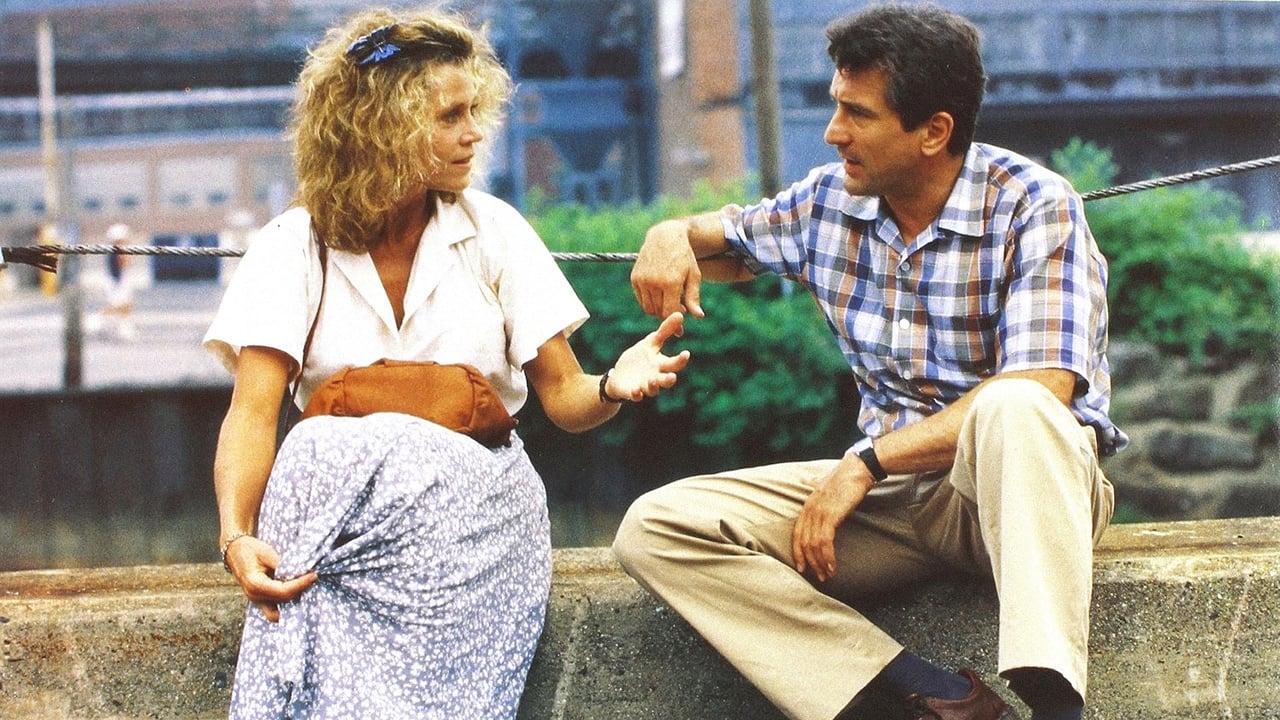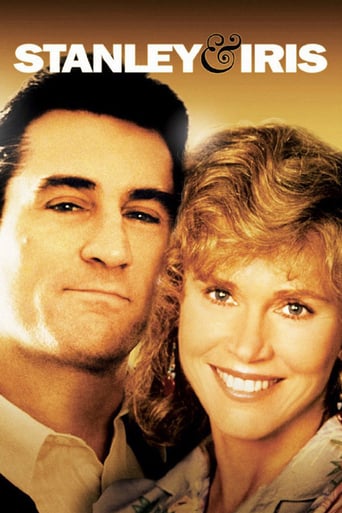



Dreadfully Boring
It’s an especially fun movie from a director and cast who are clearly having a good time allowing themselves to let loose.
View MoreThis movie tries so hard to be funny, yet it falls flat every time. Just another example of recycled ideas repackaged with women in an attempt to appeal to a certain audience.
View MoreIt’s fine. It's literally the definition of a fine movie. You’ve seen it before, you know every beat and outcome before the characters even do. Only question is how much escapism you’re looking for.
View MoreThe year: 1990: 3 films are released with Robert Dinero: Awakenings, Goodfellas: Stanley and Iris. Each carries their own weight: the talents found in Goodfellas can be seen in this film.When Deniros illiterate character runs in the rain to Fonda's character and in desperation yells "teach me to read," you feel the hurt, shame, limitations and prison an adult lives in being illiterate.This is why I love Bobby: also: Fonda is fantastic too.
View MoreThe story meanders a bit but finally "gets there". Some side story lines about the sister and daughter could have been better developed or eliminated altogether, as they are, they seemed tacked on.Stanley and Iris are played by big name "stars" but that being said, they might have been more believable if played by "lesser lights". It's really hard to accept Jane Fonda having to be convinced that she is pretty. Come on ! Stanley's dad and Iris's son, Richard, get a special mention as very believable.The plight of the adult illiterate was explored quite thoroughly. One of the most fascinating aspects of this film was seeing all of the processes in the bakery but somehow I don't think that was what the filmmakers were "going for".For me : Worth a watch but not a "keeper".
View MoreThis is a complex film that explores the effects of Fordist and Taylorist modes of industrial capitalist production on human relations. There are constant references to assembly line production, where workers are treated as cogs in a machine, overseen by managers wielding clipboards, controlling how much hair the workers leave exposed, and firing workers (Stanley) who meet all criteria (as his supervisor says, are always on time, are hard workers, do good work) but who may in some unspecified future make a mistake. This system destroys families - Stanley has to send his father to a nursing home (where he quickly dies) after Stanley loses his job. Iris' daughter is a single teen mother who drops out of high school to take a job in the plant. References are made to the fact that now, with declining wages, both partners need to work, the implication being that there's nobody left at home to care for the kids. Iris' husband is dead from an illness, and with the multiple references in the film about the costs of medical care, the viewer must wonder if he might have lived with better and more costly care. Iris' brother in law gets abusive after yet another unsuccessful day at the unemployment office when his wife yells at him for buying a beer with her savings instead of leaving it for her face lift and/or teeth job (even the working class with no stake in conventional bourgeois notions of perfection and beauty buy into them). The one reference to race in the film is through a black factory line worker whose husband is in jail (presumably, he's also black, and black men suffer disproportionally high incarceration rates). She remarks that he, like her, "is doing time" - her family is composed of a prisoner and a wage slave.Stanley, however, still believes in human relations and is therefore for most of the film outside of the system of Fordist capitalism. He cares for his father in spite of the fact that it was his father's traveling salesman job that resulted in his illiteracy - he has not yet reduced human relations to a purely instrumental contract, as Iris' brother in law does (suggesting that he "married the wrong sister"). He does not, as Iris says, conform to the work-eat-sleep routine of everyone else; rather, he uses technology and the techniques of industrial production in an artisanal and creative way, in a sort of Bauhaus ideal. This was the dream of early modernists and 1920's socialists (such as the Bauhaus) - to use technology to provide for all basic needs, allowing for more free time for creative human work and fuller human relations. He is also outside of traditional gender relations. He cooks, he cleans, he cares for his family, and he knows how to iron. Iris, on the other hand, lives in a traditionally male role - she's a factory worker, the mains source of income for her (extended) family, and she brings Stanley into the public realm, traditionally off-limits to women. By teaching him to read and write, she gives him access to the world of knowledge, also traditionally gendered male.Literacy here is used as a metaphor for the (traditionally masculine) public realm and the systems of circulation (monetary, vehicular, cultural) that enable participation in the public realm. Without this access, Stanley is feminized - the jobs open to him are cooking and cleaning. He is excluded from all regular circulations, unable to participate in the monetary (can't open a bank account), in the vehicular (can't get a driver's license, can't ride the bus), and in the social (he asks if he exists if he can't write his name).After learning to read, he grabs books on auto repair, farming, and spirituality (the Bible). The Word of God is therefore relativized, placed on the same value plane as how-to books. In fact, organized religion in general is only very occasionally present - the Bible also appears on a dresser as the camera pans to find Stanley and Iris having sex. It is, however, acknowledged as a moral force - Iris, clearly a character devoted to living a "good" life, mentions at the beginning of the film that her rosary was among the objects lost in a purse snatching.Once able to read, he enters the system and lands a managerial position with a health care plan, a car, and a house, taking his place at the head of the family, the breadwinner. Presumably, he's an industrial designer, dreaming up products that will require others enduring the drudgery of the assembly line to produce. This ending, probably the only bit of conventional Hollywood in the film, is so incongruous with all that has come before that I at least wonder if it wasn't forced in by some Studio exec suddenly worried about the lack of a feel-good ending and its potential effect on the bottom line.Now that, according to the pundits, we've comfortably moved on to post-industrial capitalism, the film also has a slightly nostalgic feel, as though we needed the historical distance to really analyze what happened during that period. Nevertheless, it's highly recommended - at least if you want to exercise your brain. Disregard the ending, and it's close to a perfect 10.
View MoreAs the last film directed by the redoubtable Martin Ritt, this 1990 drama is full of good intentions about adult illiteracy and has two proved star actors, Jane Fonda and Robert DeNiro, in the lead roles. Nonetheless, it rarely hovers above the level of a Lifetime TV-movie, as the story amounts to a series of episodes around the burgeoning relationship between Iris, a recently widowed worker in a pastry factory and Stanley, a quiet, illiterate cook who likes to invent mechanical contraptions in the privacy of his apartment. They meet when he is hired at the company cafeteria, but he loses his job when it becomes clear he cannot read or write. Realizing his illiteracy has prevented him from taking care of his ailing father, Stanley asks Iris to teach him. The rest is pretty inevitable, though there are affecting moments along the way mainly because DeNiro is able to convey the basic decency and veiled humiliation of his character.What I do miss in DeNiro's performance is the edge of danger that makes him truly transcend his best roles like what he did right after this film as Jimmy Conway in Martin Scorsese's "Goodfellas". Stanley seems to be a distant cousin of DeNiro's similarly passive and inarticulate character in Ulu Grosbard's 1984 "Falling in Love". In what was to be her last film for fifteen years, Jane Fonda seems woefully miscast, looking too intellectually alert and physically aerobicized to portray Iris with conviction. Begging for a Kathy Bates-type to inhabit her, Iris should be downcast about her life and feeling a deepening loneliness about her situation, but Fonda's off-screen resourcefulness makes it difficult to believe this woman would truly feel stuck. It also feels disingenuous of the character to talk about her weight concerns and wanting a couple of eclairs when we are looking at an actress who has made millions on her workout tapes.Regardless, Ritt is also a master when it comes to showing the trials of everyday people in working class settings, and there is genuine chemistry between the two actors, which helps considerably as the story meanders toward its conclusion. The rest of the cast is used inconsistently as plot devices, in particular, Swoosie Kurtz as Iris's battered sister, who oddly disappears midway through the story, and Martha Plimpton as Iris's sullen, impregnated daughter. I have to conclude the primary problem with the film is the episodic screenplay by Harriet Frank, Jr. and Irving Ravetch, both of whom have teamed with Ritt on a number of superior films like "Hud" and "Norma Rae". The DVD has no extras.
View More